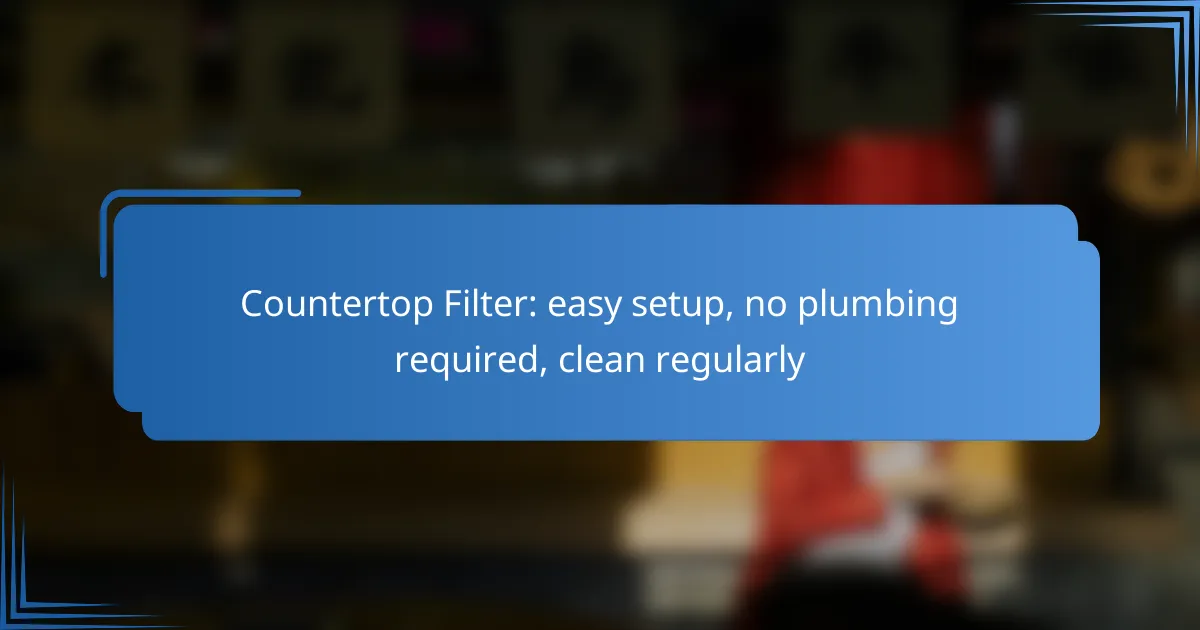Countertop filters offer a convenient solution for clean drinking water, requiring no plumbing and minimal setup effort. With popular options like the Brita Stream Filter and Pur Ultimate Filter, you can enjoy effective filtration while keeping maintenance simple. To ensure optimal performance, it’s important to clean your filter every few weeks, preventing contaminants from building up and maintaining water quality.

How to set up a countertop filter without plumbing?
Setting up a countertop filter without plumbing is straightforward and requires minimal effort. These filters are designed for easy installation, allowing you to enjoy clean water without the need for complex plumbing work.
Easy installation process
The installation of a countertop filter typically involves placing the unit on your kitchen counter and connecting it to your faucet. Most models come with a diverter valve that allows you to switch between filtered and unfiltered water easily.
Because no permanent plumbing modifications are necessary, you can set up the filter in a matter of minutes. This convenience makes countertop filters an attractive option for renters or those who prefer not to alter their plumbing systems.
Required tools and materials
- Countertop filter unit
- Wrench (if needed)
- Mounting bracket (optional)
Check the manufacturer’s instructions for any additional components that may be included with your specific model.
Step-by-step setup guide
Begin by unboxing your countertop filter and reviewing the included manual. First, place the filter on a flat surface near your sink. Then, attach the diverter valve to your faucet, ensuring a secure fit.
Next, connect the filter to the diverter valve using the provided tubing. Turn on the faucet and switch to the filtered water setting to flush the system for a few minutes, as recommended by the manufacturer. Finally, check for leaks and make any necessary adjustments.
Regular maintenance is crucial for optimal performance. Clean the filter according to the manufacturer’s guidelines, typically every few months, to ensure the best water quality.

What are the best countertop filters available?
Some of the best countertop filters include the Brita Stream Filter, Pur Ultimate Filter, and ZeroWater Filter. These options are popular for their ease of setup, effective filtration, and minimal maintenance requirements.
Brita Stream Filter
The Brita Stream Filter is designed for quick and easy setup without the need for plumbing. It uses a unique filter technology that allows for a faster flow rate, providing filtered water on demand.
Consider the filter’s lifespan, which typically lasts for about two months or 40 gallons, depending on usage. Regularly replacing the filter ensures optimal performance and water quality.
Pur Ultimate Filter
The Pur Ultimate Filter offers advanced filtration capabilities, removing contaminants like lead and chlorine from tap water. Its setup is straightforward, requiring no special tools or plumbing modifications.
This filter generally lasts for about three months or 100 gallons, making it a cost-effective choice. Ensure you check the filter indicator to know when it’s time for a replacement to maintain water purity.
ZeroWater Filter
The ZeroWater Filter is known for its five-stage filtration system, which effectively reduces total dissolved solids (TDS) in water. This filter provides a comprehensive solution for those seeking high-quality drinking water without complex installation.
With a filter life of approximately 40 gallons, it’s essential to monitor TDS levels regularly using the included meter. This helps ensure that the filter is functioning correctly and that your water remains clean and safe to drink.

How often should you clean a countertop filter?
You should clean a countertop filter every few weeks to maintain optimal performance and water quality. Regular cleaning prevents the buildup of contaminants and ensures that the filter continues to function effectively.
Recommended cleaning frequency
For most countertop filters, a cleaning schedule of every 2 to 4 weeks is advisable. If you notice a decrease in water flow or taste, consider cleaning more frequently. Some models may have specific guidelines, so always refer to the manufacturer’s instructions.
In areas with hard water or high sediment levels, you may need to clean your filter more often—potentially every week. Keeping a consistent schedule helps prolong the lifespan of the filter and ensures cleaner water.
Signs that cleaning is needed
Common signs that your countertop filter needs cleaning include a noticeable change in water taste or odor, reduced water flow, or visible sediment buildup. If you experience any of these issues, it’s time to clean the filter.
Additionally, if the filter has a built-in indicator light or alert system, pay attention to those signals. Ignoring these signs can lead to decreased filtration efficiency and potentially contaminated drinking water.

What are the benefits of using a countertop filter?
Countertop filters provide an easy way to improve water quality without the need for plumbing modifications. They enhance taste, save money, and contribute to environmental sustainability.
Improved water taste
Countertop filters effectively remove impurities such as chlorine, sediment, and heavy metals, which can negatively affect the flavor of tap water. By using activated carbon or reverse osmosis technology, these filters can significantly enhance the overall taste and odor.
For those who find tap water unpalatable, a countertop filter can make drinking water more enjoyable, encouraging better hydration habits. Regular maintenance, such as changing filters every few months, ensures optimal performance and taste.
Cost-effective solution
Investing in a countertop filter can lead to substantial savings compared to purchasing bottled water. While the initial cost may vary, many filters pay for themselves within months through reduced bottled water expenses.
On average, a countertop filter can cost between $30 and $200, depending on the model and features. With proper care, these systems can last several years, making them a financially sound choice for households.
Environmental impact reduction
Using a countertop filter helps reduce plastic waste generated from bottled water. By opting for filtered tap water, households can significantly decrease their reliance on single-use plastic bottles.
In addition to cutting down on plastic waste, countertop filters often use less energy compared to large-scale water purification systems. This choice supports a more sustainable lifestyle while ensuring access to clean drinking water.

What are the common issues with countertop filters?
Countertop filters can face several common issues that affect their performance and water quality. Understanding these problems helps in maintaining the filter and ensuring clean drinking water.
Clogged filters
Clogged filters are a frequent issue with countertop filters, often resulting from sediment buildup or mineral deposits. Regularly replacing or cleaning the filter cartridge can prevent this problem, typically every few months, depending on usage and water quality.
To minimize clogging, consider pre-filtering your water if it contains high levels of sediment or particulate matter. This can extend the life of your countertop filter and improve water flow.
Leakage problems
Leakage can occur if the filter is not properly installed or if the seals are worn out. Regularly check the connections and seals to ensure they are tight and in good condition. If you notice water pooling around the base, it may indicate a need for maintenance.
Using plumber’s tape on threaded connections can help prevent leaks. If leaks persist, consider replacing the filter or consulting the manufacturer for troubleshooting advice.
Inconsistent water flow
Inconsistent water flow can be caused by clogged filters or air trapped in the system. If the water flow slows significantly, check the filter for clogs and clean or replace it as needed. Air pockets can often be resolved by running the water for a few minutes.
To maintain a steady flow, ensure that the filter is installed correctly and that there are no kinks in the hose. Regular maintenance checks can help identify issues before they affect water delivery.

How to choose the right countertop filter for your needs?
Selecting the right countertop filter involves assessing your water quality, filter type, and specific needs. Consider factors like contaminant removal, maintenance requirements, and budget to find a suitable option.
Factors to consider
Start by testing your water to identify contaminants such as chlorine, lead, or sediment. This will help you choose a filter that effectively targets those specific impurities. Additionally, consider the filter’s capacity and how often you will need to replace it.
Maintenance is another crucial factor. Some filters require regular cleaning or replacement of cartridges, while others may have longer lifespans. Evaluate your willingness to perform maintenance tasks when selecting a model.
Filter type comparisons
Countertop filters generally fall into several categories, including activated carbon, reverse osmosis, and ceramic filters. Activated carbon filters are effective for removing chlorine and improving taste but may not eliminate heavy metals.
Reverse osmosis systems provide thorough purification by removing a wide range of contaminants, including dissolved solids. However, they can be more expensive and may waste some water during the filtration process. Ceramic filters are durable and can be cleaned, making them a good choice for long-term use.
When comparing these types, consider factors like initial cost, maintenance, and the specific contaminants you need to address. A balance between effectiveness and convenience will guide you to the right choice for your countertop filter needs.

What are the alternatives to countertop filters?
Alternatives to countertop filters include pitcher filters, faucet-mounted filters, and under-sink filtration systems. Each option has its own setup requirements, filtration capabilities, and maintenance needs.
Pitcher Filters
Pitcher filters are portable and easy to use, requiring no installation. Simply fill the pitcher with tap water, and the filter will remove contaminants as the water passes through.
However, they typically have a limited capacity, often holding only a few liters. Regular replacement of the filter cartridge is necessary, usually every couple of months, depending on usage.
Faucet-Mounted Filters
Faucet-mounted filters attach directly to your kitchen faucet, providing a convenient way to filter water on demand. They can be switched on and off as needed, allowing for both filtered and unfiltered water.
These filters usually have a higher flow rate compared to pitcher filters, but they may require more frequent maintenance and filter changes. Installation is straightforward, often requiring just a few tools.
Under-Sink Filtration Systems
Under-sink filtration systems are more permanent solutions that provide high-quality water directly from your tap. They involve a more complex installation process and often require plumbing adjustments.
These systems can filter a larger volume of water and may include multiple stages of filtration for better purification. Regular maintenance is essential, including filter changes every six months to a year, depending on the system and water quality.
